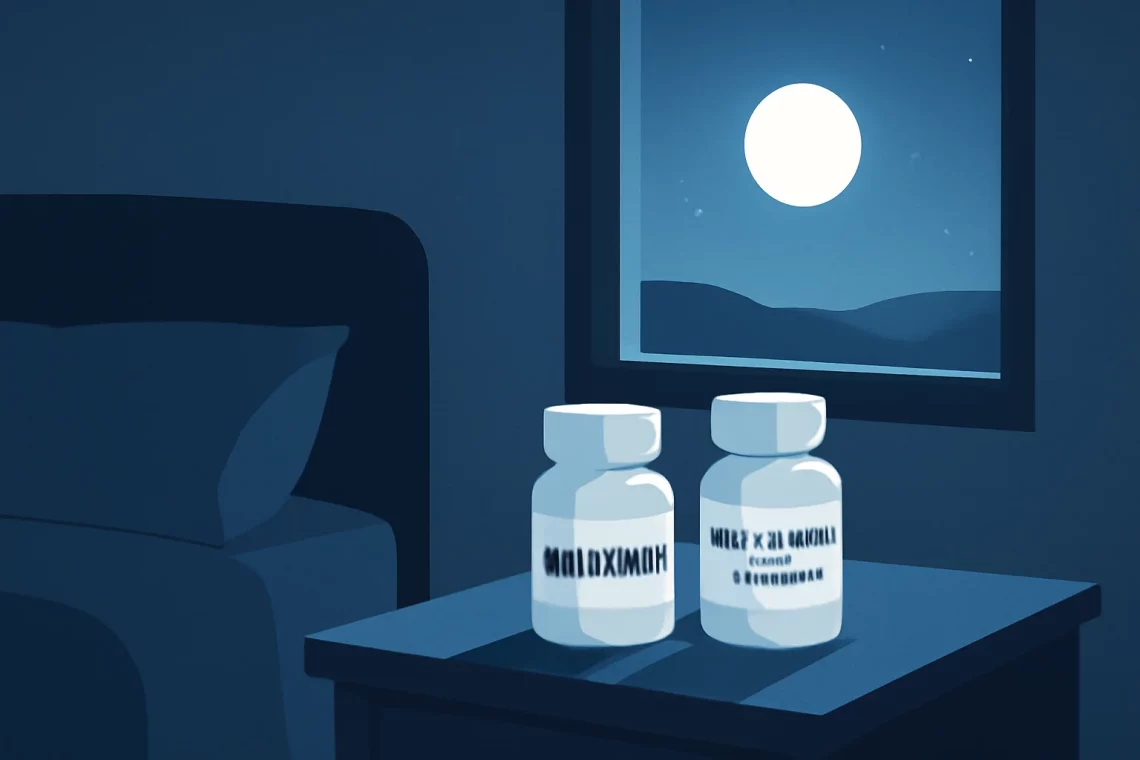
Melatonin vs Diphenhydramine: Which Sleep Aid Is Right for You?
Sleep is an essential aspect of human health and well-being, yet many individuals struggle to attain the restorative rest they need. Various factors can contribute to sleep disturbances, including stress, lifestyle choices, and underlying medical conditions. As a result, many people turn to sleep aids to help them drift off to slumber. Among these aids, melatonin and diphenhydramine are two popular options that have garnered attention for their effectiveness in promoting sleep.
Melatonin, a hormone naturally produced by the body, plays a crucial role in regulating sleep-wake cycles. On the other hand, diphenhydramine, an antihistamine commonly found in over-the-counter medications, is often used for its sedative properties. While both substances are used to combat insomnia and improve sleep quality, they operate through different mechanisms and have distinct profiles regarding side effects and efficacy. Understanding the differences between melatonin and diphenhydramine can help individuals make more informed decisions about their sleep aid choices, ultimately leading to better sleep health and quality of life.
Understanding Melatonin: The Natural Sleep Hormone
Melatonin is a hormone that is primarily produced by the pineal gland in the brain. Its secretion is closely tied to the body’s circadian rhythms, which dictate the sleep-wake cycle. Typically, melatonin levels rise in the evening as darkness falls and decrease during daylight hours. This natural fluctuation helps signal to the body when it is time to sleep and when it is time to wake.
For individuals struggling with sleep disorders or irregular sleep patterns, melatonin supplements can be a viable solution. These supplements are available in various forms, including pills, gummies, and liquid. They work by mimicking the body’s natural melatonin levels, thereby facilitating the onset of sleep. Many people find melatonin particularly helpful for adjusting to new time zones or overcoming jet lag, as it can help sync the body’s internal clock with the external environment.
Research has shown that melatonin can improve sleep duration and quality, especially in those with sleep disorders. It is generally well-tolerated, with fewer side effects compared to many prescription sleep medications. Common side effects may include dizziness, daytime drowsiness, and vivid dreams, but these are typically mild and short-lived.
One significant aspect of using melatonin is the importance of timing and dosage. Taking melatonin too early or too late can disrupt sleep patterns rather than enhance them. Experts recommend starting with a low dose, usually around 0.5 to 3 milligrams, about 30 minutes to an hour before bedtime. It’s important to note that melatonin is not a sedative; rather, it helps to promote the natural sleep cycle, making it more suitable for those who have difficulty falling asleep rather than those who struggle with staying asleep.
Melatonin is widely regarded as safe for short-term use, but long-term effects are still being studied. Individuals considering melatonin supplements, especially those with underlying health conditions or who are pregnant or breastfeeding, should consult with a healthcare provider to ensure it is appropriate for their situation.
Diphenhydramine: The Antihistamine Sleep Aid
Diphenhydramine is an antihistamine that is commonly used to relieve allergy symptoms, such as sneezing, runny nose, and itchy eyes. However, it is also well-known for its sedative properties, which make it a popular choice as an over-the-counter sleep aid. Diphenhydramine works by blocking the action of histamine, a substance in the body that can cause allergic reactions and wakefulness.
When taken as a sleep aid, diphenhydramine can help individuals fall asleep faster and stay asleep longer. Many people turn to diphenhydramine because it is readily available in various forms, including tablets, capsules, and liquid formulations. It’s often found in combination with other ingredients in cold and flu medications, making it easily accessible.
While diphenhydramine can be effective for occasional sleeplessness, it is essential to be aware of its potential side effects. Commonly reported side effects include dry mouth, dizziness, constipation, and next-day drowsiness. These side effects can be particularly concerning for older adults, who may be more sensitive to the sedative effects of diphenhydramine and at a higher risk of falls and cognitive impairment.
Unlike melatonin, which aligns with the body’s natural sleep-wake cycle, diphenhydramine does not address the underlying causes of insomnia. Instead, it simply induces drowsiness, which may not lead to restorative sleep. Chronic use of diphenhydramine for sleep is generally not recommended due to the risk of dependency and tolerance. Over time, individuals may find they need to take higher doses to achieve the same sedative effects, which can lead to increased side effects and health risks.
It’s important to use diphenhydramine responsibly and only for short-term sleep issues. Individuals with certain health conditions, such as glaucoma, asthma, or prostate enlargement, should consult with a healthcare provider before using diphenhydramine as a sleep aid. Additionally, combining diphenhydramine with alcohol or other central nervous system depressants can enhance its sedative effects and increase the risk of adverse outcomes.
Comparing Melatonin and Diphenhydramine: Pros and Cons
When considering melatonin and diphenhydramine as sleep aids, it’s essential to weigh their respective benefits and drawbacks. Both options have their place in promoting better sleep, but they cater to different needs and preferences.
Melatonin is often favored for its natural approach to sleep regulation. As a hormone that the body produces naturally, many individuals feel more comfortable using melatonin supplements rather than pharmaceutical drugs. The side effects associated with melatonin are generally mild, making it suitable for long-term use for those who require ongoing support for their sleep. Its ability to facilitate the body’s natural sleep-wake cycle makes it particularly effective for individuals experiencing jet lag or shift work disorder.
In contrast, diphenhydramine is a more immediate solution for sleep issues. Its sedative effects can help individuals fall asleep quickly, which can be beneficial for those who experience occasional sleeplessness due to stress or environmental factors. However, the potential for side effects and the risk of dependency with long-term use raises concerns. Consequently, diphenhydramine is best suited for short-term use rather than a long-term sleep strategy.
Ultimately, the choice between melatonin and diphenhydramine may come down to individual preferences and specific sleep challenges. Those looking for a natural, long-term solution may find melatonin more appealing, while those seeking immediate relief from occasional sleeplessness may opt for diphenhydramine.
It’s crucial to remember that both sleep aids are not without risks, and their use should be approached with caution. Consulting with a healthcare provider can help individuals determine the most appropriate option based on their unique circumstances.
In conclusion, while melatonin and diphenhydramine both serve as aids for sleep, they operate differently and cater to different needs. Understanding these differences can empower individuals to make informed choices about their sleep health and improve their overall quality of life.
**Disclaimer:** This article is not intended as medical advice. For any health-related issues, please consult a healthcare professional.




